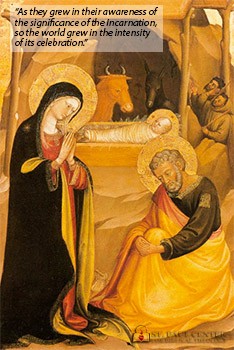
The apologist C.S. Lewis imagined an unredeemed world as a place where it was always winter, but never Christmas.
This winter I find myself in a different place from Lewis’s imagining. It’s always Christmas, it seems — and that is as it should be.
My book about Christmas, Joy to the World, appeared shortly before Advent last year; and the reviews and press coverage were the stuff of an author’s wildest dreams. I spent much of December responding to newspaper reporters, talking to radio interviewers, and traveling to television networks. My chitchat and sound bytes were consistent with the subtitle of my book: How Christ’s Coming Changed Everything (and Still Does).
Thus, my Advent was more focused than ever. So was my Christmas. That was a gift, and it keeps on giving — because here we are in January, and I’m still transfixed by the thought of Christ’s coming. I’m still amazed by the fact that God became man.
In the Old Testament he had made brief cameo appearances in the drama; but with the New Testament he came to stay. He made his home here, in a family like yours and mine — and, in fact, he wants to make his home precisely where you and I make ours.
We should be as astonished by the Incarnation as the shepherds were on that Bethlehem hillside. God has come to earth to share his divine life with us. How can we contain our joy?
And why should we contain it within December? The Christmas season continues for its allotted days, ending almost at mid-January, with the Feast of the Baptism of Our Lord. We should not let the terms of our celebration be dictated by advertisers. Our tradition sustains the joy at least a little longer.
Even so, I wonder now — and I truly hope — if I should feel this joy always. In my book I trace Christmas back to its origins, and I note that the feast has not always had the prominence we give it today. In fact, it’s possible that the earliest Church marked no particular day to celebrate Jesus’ birth.
Yet there’s no doubt that the first Christians knew the joy of Christmas. They knew that their salvation had come — that he came by way of the family — that he was God, and yet he was a baby — that he came to save his people from their sins.
They did not keep their joy bottled up in a day, an octave, or a season. They let it flow into the world — a world they converted to Christ in fairly short order. As they grew in their awareness of the significance of the Incarnation, so the world grew in the intensity of its celebration.
Now, even secularists find Christmas impossible to escape. It’s ubiquitous and ineradicable, enforced even by Fortune 500 marketing departments. With the incarnation came heaven’s inescapable joy.
Pray for me that I will carry that joy through a demanding January. The Saint Paul Center co-sponsors its annual West Coast Biblical Conference in San Diego, California, on January 9-10. I’ll be speaking there with my colleagues Brant Pitre of Notre Dame Seminary in New Orleans and Michael Barber and John Kincaid of John Paul the Great University in San Diego.
As the month goes on, I begin my second semester at Mundelein Seminary, training men for the priesthood. I continue teaching at Franciscan University, of course, where we are now entering the second semester of the Saint Paul Center’s Letter and Sprit Continuing Seminar for graduate students.
It’s a challenge — a lot of travel, a lot of preparation, a lot of lecturing — and it’s winter, so there will surely be a lot of weather and no shortage of contagion wherever we go.
Even so, I know that it can always be Christmas. It can always be well with my soul. And if I keep that thought before me, my joy will be more contagious than anything else I carry.
I ask your prayers that I can be faithful to the gift I’ve been given. I pray that you will be faithful to all you’ve received this Christmas. And I thank you for all you do for the mission of the Saint Paul Center.













